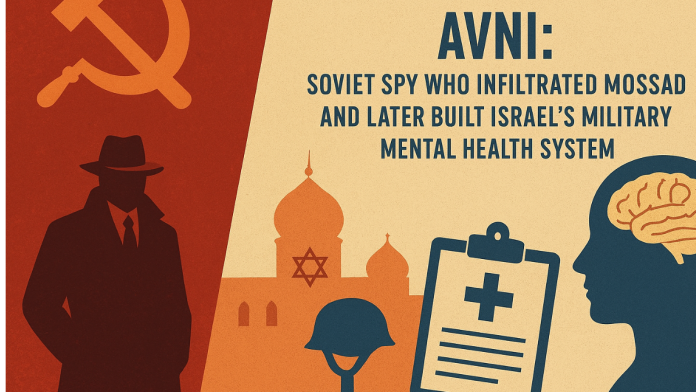Early Life and Soviet Recruitment
Ze’ev Avni, born Wolf Goldstein in Riga, Latvia, in 1921, grew up in Switzerland. Avni joined the communist movement as a teenager, influenced by family connections to leftist activities. During World War II, His fluency in multiple European languages and his dedication to communist principles led to his recruitment by Soviet military intelligence, the GRU.
Avni received training in intelligence gathering, coded communication, and cover identities. After the war, he was assigned a mission in the Middle East, including Israel, to establish a long-term presence in government and intelligence roles and provide information to Moscow.
Infiltration of Israeli Institutions
Avni adopted a new identity and immigrated to Israel with his family. He first settled on a kibbutz and later joined Israel’s foreign ministry. Diplomatic postings in Brussels, Athens, and Belgrade gave him access to sensitive information and intelligence coordination abroad.
During this period, he reportedly passed classified materials, including diplomatic communications and operational details, to the Soviet Union. He acted primarily on ideological motives and did not receive financial compensation for his spying work.
In 1956, Israeli authorities noticed inconsistencies in Avni’s behaviour. During a visit to Israel, he was confronted by senior intelligence officials with a staged disclosure of his activities. Avni admitted to his infiltration and confirmed he had provided information from embassies and intelligence contacts to Soviet handlers. He was subsequently arrested, tried, and sentenced to 14 years in prison.
Belgium supports peace deal in Gaza while maintaining sanctions on Israel
Prison and Career Transition
While in prison, Avni focused on studying psychology and sociology. He dedicated his time to understanding human behaviour, mental health, and stress. During this period, Avni renounced communism and shifted allegiance toward Israel. He earned formal qualifications in psychology, developing expertise in assessing and treating emotional and psychological conditions. His studies prepared him for his later work with military personnel.
After his release, Avni applied his knowledge to providing psychological support to Israeli soldiers. In 1973, during the Yom Kippur War, he was deployed to the frontlines to assist troops experiencing combat-related trauma and operational stress. He conducted counselling sessions, helping soldiers manage immediate psychological effects of warfare. He also contributed to structured treatment programs for long-term mental health needs, including post-traumatic stress and anxiety.
Avni’s work allowed the IDF to implement systematic mental health support for active soldiers, marking one of the first coordinated efforts to integrate psychology into military operations.
EU sanctions in crisis as Austria prioritizes bank losses over Russia pressure
Development of IDF Mental Health Programs
Avni played a central role in creating structured mental health services within the Israeli Defence Forces (IDF). He helped establish procedures for field counselling, post-combat care, and long-term psychological support for soldiers.
He collaborated with military psychologists and administrators to implement standardized protocols. The systems he helped develop integrated mental health care into military operations, ensuring soldiers could access professional assessment and treatment for stress, trauma, and other psychological conditions.
Avni’s contributions helped formalize mental health care within the IDF, providing counselling, assessment, and treatment alongside other medical services.
Kremlin mole in Vienna: Ex-spy chief charged in explosive Russian espionage case
Ongoing Contributions
The programs Avni established remain part of the IDF’s mental health framework. His work continues to support soldiers’ psychological well-being and includes methods to identify and treat mental health issues in operational and post-combat situations.
Avni’s career can be divided into two distinct phases: spying as a Soviet agent and contributions to Israel’s military mental health system. Both phases are documented in historical records, reflecting early security challenges in Israel and the creation of structured mental health support within the IDF.
His involvement in these programs ensured practical methods for integrating psychological support into military operations. Records indicate that the procedures Avni helped develop continue to guide field assessments, post-combat care, and long-term mental health support for soldiers.


